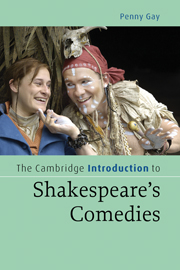Book contents
5 - Romantic comedy
Published online by Cambridge University Press: 05 September 2012
Summary
Love's Labour's Lost affectionately parodied the conventional trials of young lovers in the ancient genre of comedy – ending with surprising disappointment for the courtly characters; Much Ado About Nothing, As You Like It, and Twelfth Night together define what we now think of as the essence of ‘romantic comedy’, a genre still potent today. All three were written close together in the period 1599–1600. In this story-type the lovers do end up together, but only after trials that are not so much caused by external (material) problems as by internal psychological barriers. G. K. Hunter argues that romance is ‘that comic form in which the complex of plot and character is read primarily in terms of character … [and] space is given for ethical [i.e. behavioural] choice and the contemplation of values’. He goes on to caution, however, that the notion of character ‘development’ is not an appropriate term, though it may help actors with their character's ‘journey’: ‘We may say that we come to know such people, but we know them as people carried to their fates rather than people achieving them.’ Romance carries with it a suggestion of the mysterious actions of fate, as well as adventures in the world of the emotions. Place this in the standard form of comedy, with its guarantee of a happy ending for the young lovers and justice served out to any malign figures, and you have Shakespearean romantic comedy.
- Type
- Chapter
- Information
- The Cambridge Introduction to Shakespeare's Comedies , pp. 71 - 102Publisher: Cambridge University PressPrint publication year: 2008

